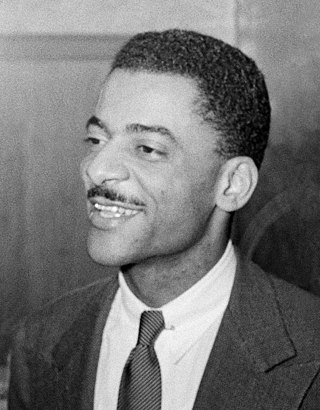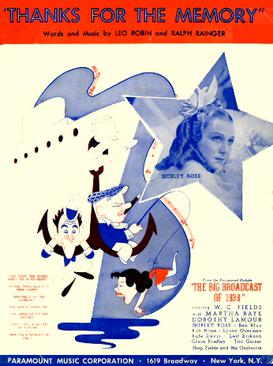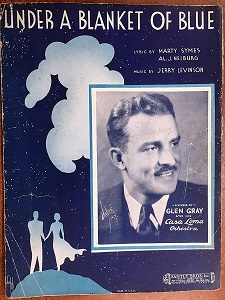
Theodore Shaw Wilson was an American jazz pianist. Described by critic Scott Yanow as "the definitive swing pianist", Wilson's piano style was gentle, elegant, and virtuosic. His style was highly influenced by Earl Hines and Art Tatum. His work was featured on the records of many of the biggest names in jazz, including Louis Armstrong, Lena Horne, Benny Goodman, Billie Holiday, and Ella Fitzgerald. With Goodman, he was one of the first black musicians to perform prominently alongside white musicians. In addition to his extensive work as a sideman, Wilson also led his own groups and recording sessions from the late 1920s to the 1980s.
Gordon Hill Jenkins was an American arranger, composer, and pianist who was influential in popular music in the 1940s and 1950s. Jenkins worked with The Andrews Sisters, Johnny Cash, The Weavers, Frank Sinatra, Louis Armstrong, Judy Garland, Nat King Cole, Billie Holiday, Harry Nilsson, Peggy Lee and Ella Fitzgerald.
"Memories of You" is a popular song about nostalgia with lyrics written by Andy Razaf and music composed by Eubie Blake and published in 1930.

"Thanks for the Memory" (1938) is a popular song composed by Ralph Rainger with lyrics by Leo Robin. It was introduced in the 1938 film The Big Broadcast of 1938 by Bob Hope and Shirley Ross, and recorded by Shep Fields and His Orchestra featuring John Serry Sr. on accordion in the film and vocals by Bob Goday on Bluebird Records. Dorothy Lamour's solo recording of the song was also popular, and has led to many mistakenly believing over the years that it was she who sang the tune with Hope in the film.
"Gone with the Wind" is a popular song. The music was written by Allie Wrubel, the lyrics by Herb Magidson. The song was published in 1937. A version recorded by Horace Heidt and his Brigadiers was a No. 1 song in 1937.

"Somebody Loves Me" is a popular song, with music written by George Gershwin, and lyrics by Ballard MacDonald and Buddy DeSylva. The song was published in 1924 and featured in George White's Scandals of 1924.
"I Gotta Right to Sing the Blues" is a popular song with music by Harold Arlen and lyrics by Ted Koehler, published in 1932 for the Broadway show Earl Carroll's Vanities (1932). The song has become a jazz and blues standard. Popular recordings in 1933 and 1934 were those by Cab Calloway, Louis Armstrong and Benny Goodman.
"East of the Sun " is a popular song written by Brooks Bowman, an undergraduate member of Princeton University's Class of 1936, for the 1934 production of the Princeton Triangle Club's production of Stags at Bay. It was published in 1934 by Santly Bros. and soon became a hallmark of the Princeton Tigertones, Princeton University's signature all-male a cappella group. The standard is also sung by the Princeton Nassoons.
"Have You Met Miss Jones?" is a popular song that was written for the musical comedy I'd Rather Be Right. The music was written by Richard Rodgers and the lyrics by Lorenz Hart. The song was published in 1937.
Irving "Babe" Russin was an American tenor saxophone player.
"I've Got a Crush on You" is a song composed by George Gershwin, with lyrics by Ira Gershwin. It is unique among Gershwin compositions in that it was used for two different Broadway productions: Treasure Girl (1928), when it was introduced by Clifton Webb and Mary Hay, and Strike Up the Band (1930), when it was sung by Doris Carson and Gordon Smith. It was later included in the tribute musical Nice Work If You Can Get It (2012), in which it was sung by Jennifer Laura Thompson. When covered by Frank Sinatra he was a part of Columbia Records.
"Get Happy" is a song composed by Harold Arlen, with lyrics written by Ted Koehler. It was the first song they wrote together, and was introduced by Ruth Etting in The Nine-Fifteen Revue in 1930. The song expresses the gospel music theme of getting happy, an expression of religious ecstasy for salvation.
Alvin Stoller was an American jazz drummer. Though he seems to have been largely forgotten, he was held in high regard in the 1940s and 1950s. He was best known for playing drums on both Mitch Miller's recording of "The Yellow Rose of Texas" and Stan Freberg's parody of Miller's recording.
"Please Be Kind" is a 1938 American song composed by Saul Chaplin with lyrics by Sammy Cahn. Popular recordings that year were by Mildred Bailey and the Red Norvo Orchestra; Bob Crosby & His Orchestra ; and by Benny Goodman & His Orchestra.

"Serenade in Blue" is a 1942 Big Band song composed by Harry Warren, with lyrics written by Mack Gordon. It was introduced in the 1942 film Orchestra Wives by Glenn Miller and His Orchestra, sung by Lynn Bari in the film but dubbed by Pat Friday.
Henderson Chambers was an American jazz trombonist.

When Harry Met Sally... is the soundtrack to the movie When Harry Met Sally... starring Billy Crystal and Meg Ryan. The songs are performed by pianist Harry Connick Jr., who won the Grammy Award for Best Jazz Male Vocal Performance.
"Goodbye" is a song by American composer and arranger Gordon Jenkins, published in 1935. It became well known as the closing theme song of the Benny Goodman orchestra.
"Can't We Be Friends?" is a 1929 song with lyrics by Paul James and music by Kay Swift, introduced on Broadway in The Little Show by Libby Holman. It was later recorded by many artists including Bing Crosby, Ella Fitzgerald, and Frank Sinatra.
"Once I Loved" is a bossa nova and jazz standard song composed in 1960 by Antônio Carlos Jobim, with lyrics by Vinícius de Moraes. Words in English were later added by Ray Gilbert. In a few early cases, the song was also known as, a translation into English of the original Portuguese title.





